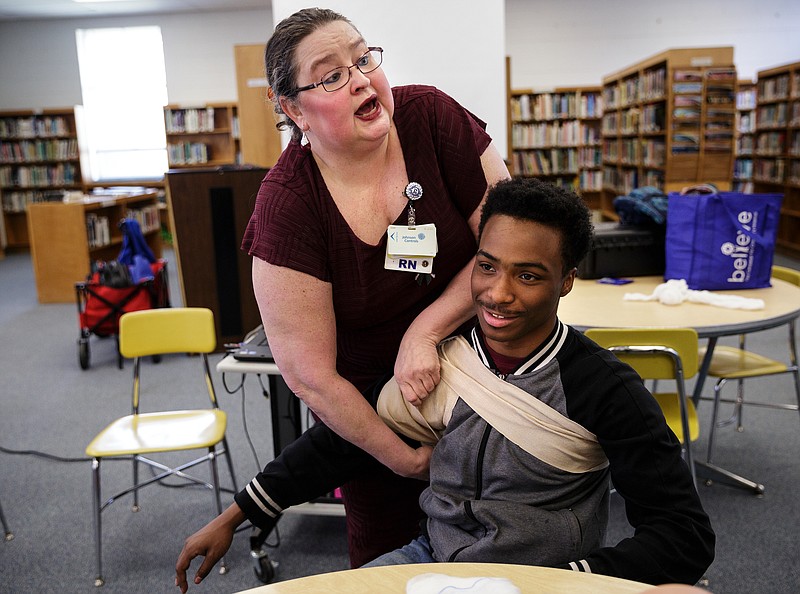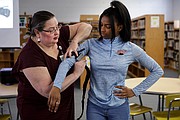Brainerd High School seniors La'breuna Merity and Darianna King envisioned themselves in medical careers starting in ninth grade.
As health science students, they've spent class time honing skills for their future professions - Merity plans to become a traveling nurse and King a physical therapist.
But when Regena Young, trauma outreach and injury prevention coordinator at Erlanger Health System, taught their Wednesday afternoon anatomy and physiology class ways to stop severe bleeding, the two gained a broader appreciation for their studies.
Tourniquet mistakes
Common tourniquet mistakes, according to Young:Not using one — T-shirts and scarfs work as backup!Waiting too long to apply — don’t hesitate!Not tightening enough — apply 2nd if needed!Loosening it — expect discomfort!Removing it — leave this to medical professionals!
"Everybody should know this, not just people going into the medical field," King said. "There's a lot of crime going on, and you never know what can happen on the streets."
Young's class is called Stop the Bleed, a national campaign to educate and train the public to triage trauma patients until first responders arrive.
Although the program began as an effort to improve public preparedness in the case of mass casualty and active shooter events, Young said the training applies to other situations, such as automobile and work accidents, as well.
"The number one cause of death in trauma patients prior to their arrival at the hospital is bleeding out, and that can happen in 5 to 10 minutes," Young said. "Especially in a mass casualty incident, it's really the person standing next to you that's going to save your life."
Erlanger offers the free training, which is available to churches, business, schools or community groups throughout the region. Participants learn the basics of applying tourniquets and packing wounds, and each entity receives a multi-use bleeding kit that can treat up to eight people courtesy of the Southeast Tennessee Hospital Coalition.
"What we want to do is give people the confidence to intervene and practice these hands-on skills so they know what to do in an emergency," Young said.
Aside from the "how to," Young dispels common myths, like one that tight tourniquets can cause more harm than good.
"What results in amputations to limbs has more to do with the damage caused by either machinery, a crush injury, infection, that kind of thing," she said. "Regardless, it's better to risk injury to an arm than to lose your life."
Young estimates that about 35 of 75 bleeding kits have been distributed since Erlanger's program began.
"We all work together to cover as many schools as possible, and we're really focusing on the middle and high school students right now to get these 75 kits out," she said, adding that Hixson High School is next on her schedule.
The Hamilton County Schools district doesn't require the trainings, but many schools are opting to offer them to faculty and some students.
Tina Lutz, health science teacher at Brainerd High, called upon Young in the past to teach faculty, but this week was the first time the class was presented to students.
"With everything going on today with the school shootings, I just deemed it the appropriate time to have this," Lutz said. "You can call 911 all day, and then you're just going to stand there and watch them bleed to death when you don't have to, when you can get the training that you need."
Glenn Perry, assistant principal at Brainerd High, said the purpose of the session was twofold: preparing for emergencies and introducing Hamilton County Schools' Future Ready Institute program.
Although the school's health science track began five years ago, its popularity among students and the community's need for such jobs align well with the district's initiative, which aims to prep students for life after high school.
Starting in the fall, Brainerd High will house the Institute of First Responders and Forensic Science - featuring courses like Stop the Bleed - and The Institute of Aviation.
After completing Young's class, Merity and King both earned a certificate in bleeding control, giving them a glimpse of what their careers might look like and possibly helping them land jobs.
Merity said she was surprised by the simplicity of applying tourniquets.
"I thought they only used those in the hospitals," she said. "I feel like I understand better what to do, and it's always nice to just help anybody out."
Glenn said he expects more trainings in the fall.
"It's a way to give students some early, hands-on opportunities into the activities they'll do as part of these Future Ready Institutes," Perry said. "Health care and early response in crisis situations are something that our society will always need."
Contact staff writer Elizabeth Fite at efite@timesfreepress.com or 423-757-6673.

